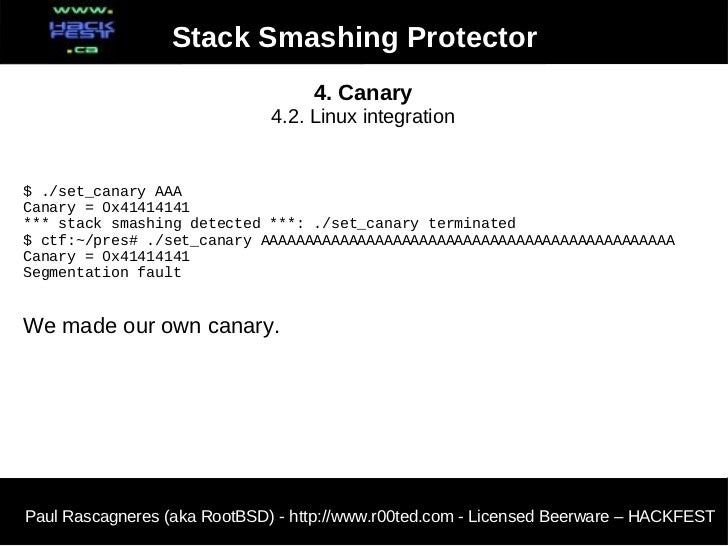
I would have liked to give more references and articles in english about this flaw but nobody seemed have write about this thing. _fortify_fail_abort is added to avoid backtrace from _libc_message is changed to acceptĮnum _libc_message_action and call BEFORE_ABORT only if action includesĭo_backtrace. _stack_chk_fail is called on corrupted stack. Before returning from a function the canary is verified. On many C implementations it is possible to corrupt the execution stack by writing past the end of an array declared auto in a routine. A canary is placed before the return address on the stack. Smashing The Stack For Fun And Profit by Aleph One smash the stack C programming n. SSP is a technique where a compiler will instrument a binary to check if part of the program stack has been overwritten. (need_backtrace & _libc_argv != NULLĪnd, here is the comment attached to the original commit introducing the patch:Īvoid backtrace from _stack_chk_fail This post’s topic is Stack Smashing Protection (SSP). _libc_message (need_backtrace ? (do_abort | do_backtrace) : do_abort, _libc_argv if we aren't doing backtrace since _libc_argv * The loop is added only to keep gcc happy. _fortify_fail_abort (_Bool need_backtrace, const char *msg)
#STACK SMASHING DETECTED LINUX CODE#
Here is an answer on Unix/Linux Stack-Exchange site that pinpoint the part of the code of glibc that is responsible for that. That is why, sometime last year, some developers decided to avoid to use argv when displaying information about the stack-smashing and replaced it by. Linux stack smashing detected XXXX terminated 1gdb valgrind Linux stack smashing detected. If a secret key or some confidential data were stored in the stack, then an attacker can access it through this feature. As fork() is cloning the memory of the initial process, the ASLR was useless because the same starting memory image was used and, then, the same memory mapping was used again and again. This technique was mainly used in servers where fork() was used to respawn an instance. Indeed, if you can control the address at argv and crash the application, you can leak the whole stack outside of the application.

When any of these flags are used, GCC instruments the function return instruction with a. I get the following error when loading a yolov3 model using the converter tool: stack smashing detected : terminated Using GDB, I get : stack smashing. The GCC flags -fstack-protector and -fstack-protector-all activate the Stack Smashing Protector (SSP).

But, some attackers started to exploit the fact that you could overflow the stack, reach the argv and overwrite it with an address that you choose. Notice the message stack smashing detected, which implies that GCCs stack protector feature is being used. The " " (which is a static string added by -fstack-protector) that you see was previously argv. In fact, this is a fairly recent mitigation mechanism introduced to avoid to leak information about the stack of the crashed application.


 0 kommentar(er)
0 kommentar(er)
